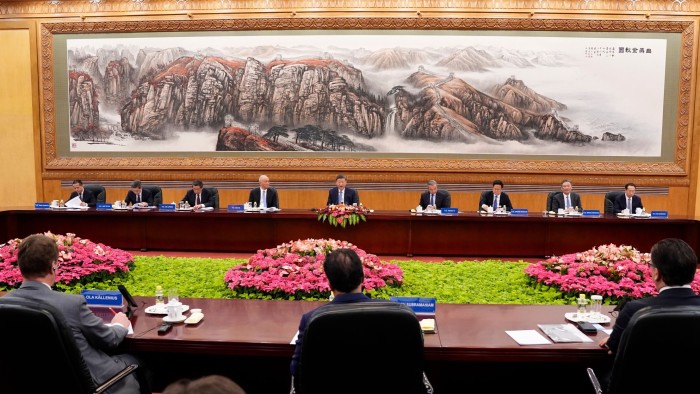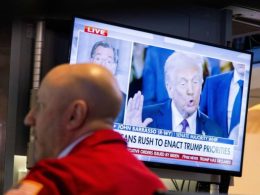Capping a week of courting the world’s top CEOs, President Xi Jinping on Friday made one of his most impassioned defences yet of international trade, as the system of globalised supply chains that helped catapult China to economic superpower status teeters on the brink.
Just days before Donald Trump’s self-declared “liberation day” on April 2, when the US president is set to unleash a new wave of tariffs on America’s trading partners, a smiling Xi led a group of more than 40 global business leaders into an ornate room in Beijing’s Great Hall of the People.
Without naming the US, Xi told his guests, who ranged from HSBC’s Georges Elhedery and Mercedes-Benz’s Ola Källenius to Saudi Aramco’s Amin Nasser and Toyota’s Akio Toyoda, that some countries were “weaponising” trade and “forcing companies to take sides and make choices that go against economic principles”.
“We must jointly maintain the multilateral trading system, jointly maintain the stability of the global industrial chain,” he said.
The meeting with the business leaders followed a week in which China hosted its most important annual business summits: the China Development Forum in Beijing and the Boao Forum for Asia in the tropical resort island of Hainan.
The message at both was that — compared with Trump’s chaotic policymaking — Beijing was a bastion of stability and a champion of the global trading system from which it, arguably more than any other country, had benefited and upon which it was still heavily reliant.
Trump has threatened to impose sweeping “reciprocal” tariffs on America’s trading partners on Wednesday. The US is due on Tuesday to conclude extensive investigations into its trade with China as well as Beijing’s industrial policy, subsidies and diversion of trade through other countries.
Analysts say many foreign trading partners have soured on China in recent years, accusing it of running huge surpluses while putting up extensive barriers to its domestic market. But Trump’s threats to globalisation have made international business more receptive to Beijing’s message.
“China after all is quite stable — there are no surprises in policymaking,” said Denis Depoux, global managing director at consultancy Roland Berger, who attended the Beijing and Bo’ao forums. “Maybe because the rest of the world has become chaotic, so China looks better than before.”
At the annual meeting of China’s rubber stamp parliament this month, leaders sought to shore up that image of stability with an ambitious GDP growth target of 5 per cent for this year, backed by plans for a record central government budget deficit.
“If you’re wanting to ask about China and its place in the globe, in the world, what I’m witnessing is a quiet resoluteness, that they believe they’re on the right path,” said Andrew Forrest, the Australian mining billionaire who also attended both forums.
“No matter the changes in the external environment, China will open wider to the world,” vice-premier Ding Xuexiang, a member of the elite standing committee of the Communist party’s governing politburo, assured those gathered in Bo’ao.
China’s relative stability and recent successes with advanced technology — such as the emergence of its DeepSeek artificial intelligence software — have emboldened some scholars to proclaim its party-led, state-driven development is a superior model for the so-called “global south” of non-aligned developing countries.

“Western modernisation . . . is very exclusive,” Zheng Yongnian of the Chinese University of Hong Kong, Shenzhen told a panel discussion on the global south in Bo’ao. “The west doesn’t help other countries, poor countries, to develop.”
Zheng said that the west instead put pressure on poor countries over issues such as human rights.
“Chinese modernisation, I give it a name, I call it . . . open source modernisation,” he said. “When you get rich, you help other countries to get rich.”
But China also has its own urgent reason for defending the global trading system: its acute dependence on exports for growth. It is a reliance that critics argue is partly to blame for the US trade backlash.
Although now the world’s second-largest economy, a chronic lack of domestic demand last year contributed to a record $1tn surplus between China and the rest of the world that has alarmed not only the US, but also the European Union and some large developing countries.
Beijing has announced numerous measures to rebalance the economy by increasing domestic consumption, the trend has been in the opposite direction, economists say.
“Chinese consumption actually declined as a share of GDP last year,” said Michael Pettis, a senior fellow at the Carnegie Endowment for International Peace.
In Bo’ao, some speakers said the system of manufacturing and exporting to rich western countries that had made some Asian nations rich since the second world war was coming to an end and they would have to find a new path to development.
“How do we build systems that will allow us to co-operate, even though the world, the global economy, no longer has a leader? That is the great challenge for the global south,” said Danny Quah, a professor at the National University of Singapore.
Huang Yiping, dean of the National School of Development at Peking University, said access to the US market would be irreplaceable “in the short term” as no other country could play the same role.
But he urged those countries still open to trade to maintain the existing infrastructure of globalisation — the IMF, World Trade Organization and other institutions.
“Despite the fact that the US influence might be declining, the rest of us should still work together and at least sustain that order,” Huang said.

China is also keen to rebuild relations with other trading partners, such as the EU. But many European business leaders and consultants warn that Beijing will need take real steps to reduce its overwhelming trade surplus with the EU, in particular, if relations are to improve.
This would include radically improving access to its own market — international investors complain of innumerable non-tariff barriers and foreign direct investment has been falling rapidly in recent years.
“In terms of openness to the outside world, outside ideas, China seems to be going in the wrong direction,” said one foreign executive. “But so is the US.”
Roland Berger’s Depoux said he had suggested to Chinese companies that to help improve access to the European market, they should propose building factories there rather than just exporting their goods.
“I tell my clients, if you go to Europe with a good plan to bring investment, knowhow and employment, the red carpet will roll out ahead of you,” he said.
Source link









